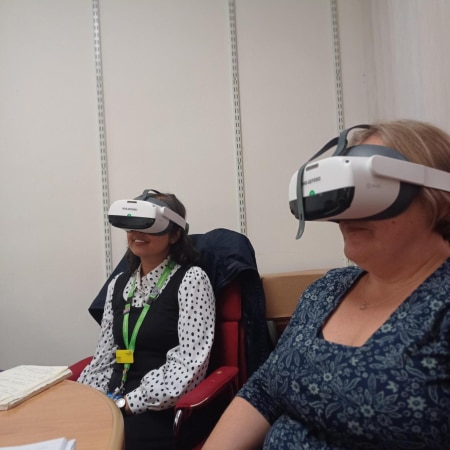How training is delivered
The GTAC uses a ‘hub and spoke’ model where the central, virtual learning environment supports in-person training at regional spokes – currently, NHS genomic laboratories and clinical genetics units. Resources include lectures, courses, webinars, workshops and more.
Who is the GTAC for?
Currently, learning is designed for NHS professionals who:
- are formally embedded within a clinical genetics unit or genomic laboratory;
- have direct responsibility for seeing patients within a clinical genetics service;
- have direct responsibility in the processing, analysis and/or interpretation of genomic test results; and/or
- are part of an external rotation into a genomics service as part of a formal NHS training programme.
Please view the list below for more details.
Who can access the GTAC?
Professionals in the roles below are assumed to have automatic access to the relevant GTAC resources; in other cases, access may need to be approved by the relevant professional leads.
Clinical genetics
- Clinical genetics registrar
- Clinical genetics fellow
- Clinical genetics consultant
- Foundation doctors
Genetic counselling
- Pre-registration genetic counsellor: MSc
- Pre-registration genetic counsellor: STP trainee
- Pre-registration genetic counsellor: apprenticeship route
- Pre-registration genetic counsellor: overseas trainee
- Registered genetic counsellors
- Principal genetic counsellor
- Consultant genetic counsellor
- Genomics associate
- Genomics practitioner
Bioinformatics
- Pre-registration bioinformatician
- STP trainee (clinical bioinformatics)
- Registered bioinformatician
- Senior bioinformatician
- Lead bioinformatician
Laboratory
- Pre-registration clinical scientist
- Registered clinical scientist
- Senior clinical scientist
- Lead/consultant clinical scientist
- Assistant genetic technologist
- Associate genetic technologist
- Genetic technologist
- Senior genetic technologist
- Lead genetic technologist
- Pre-registration biomedical scientist
- Registered biomedical scientist
- Senior biomedical scientist
- Lead/consultant biomedical scientist
- STP trainee (genomics)
- STP trainee (cancer genomics)
- STP trainee (external rotation)
How to register
If you are in one of the professional groups that the GTAC is designed for, please contact the local education and/or training lead in your NHS genomic laboratories or clinical genetics units to request a GTAC registration pack. Once you’ve submitted the form, your information will be reviewed. It may take up to five working days for your account information to be confirmed.
Questions about your e-learning account? Please see the FAQs below or contact the VLE team.
I‘ve registered but haven’t received anything yet. What happens next?
GTAC learner accounts are created via an automated batch process, so it may take up to one week for your account to go live. Occasionally, account activation emails get blocked by IT filters, so please check your spam folder. The emails will come from “Admin User (via PGVLE)” with the subject line “Postgraduate Virtual Learning Environment: New user account”. The PGVLE is the platform that hosts the GTAC’s content. If it’s been more than five working days since you signed up, please email the GTAC VLE support account.
How do I access the GTAC learning environment?
GTAC’s virtual learning environment (VLE) is currently hosted on the NHS Postgraduate Virtual Learning Environment (PGVLE) site. After signing up via the form sent by your education and/or training lead, receiving login details (which can take up to a week), and activating your GTAC PGVLE account, you can log on at bit.ly/PGVLElogin. Then, simply navigate from the home page to the “Genomics Training Academy – GTAC” area. We suggest bookmarking this URL for easy access, as more resources will be added in the coming months/year.
Why can’t I log on to my GTAC account?
The login page for learners who have received a GTAC account is located here: bit.ly/PGVLElogin. Please check your login details – your username should be the email address you signed up with, but all lowercase. If you cannot remember your password/it is not working, use the ‘Lost password?’ link on the login page to request a password reset. If this doesn’t work, please email the GTAC VLE support account.
Where are my learning resources?
Once you have received login details and activated your GTAC learner account, you can access any resources you’ve been enrolled for under the ‘My courses’ link at the top of the PGVLE website. Depending on your role, you may have been auto-enrolled for some resources. Otherwise go to the “Genomics Training Academy – GTAC” link from the PGVLE homepage (or use this link ) and follow the links to your relevant profession’s resource area. Select the resource you wish to access and then click on the ‘Enrol’ button. Please note that many GTAC resources are still in development and will be added in the next few months/year.
Why can’t I enrol in some resources?
Some of the GTAC’s resources are limited to particular learner groups; if you are not in one of these learner groups, enrolment will not be available. If you think you should have access to the resource, please check with the education and/or training lead for your genomic laboratory or clinical genetics unit.
GTAC learning resources
A number of courses and resources have been launched for specific learner groups, with many more to come. Examples of recent and upcoming packages include:
Collaborate: A Clinical Education Initiative
Online CPD sessions for the NHS’s specialist genomics workforce held throughout the year
Variant
interpretation workshops
A series of webinars and virtual workshops to complement FutureLearn courses
Virtual reality for lab skills
A suite of immersive observational VR experiences for core genetic laboratory techniques
Prenatal exomes sessions
Case-based workshops and webinars featuring knowledge-based learning
Clinical genetics SpR teaching
Online sessions delivered by subject matter experts to support clinical genetics SpR training
Faculty and governance
The GTAC is led by the clinical director and head of the Genomics Education Programme (Professor Kate Tatton-Brown) and comprises:
- the teaching faculty and GLH practice educators (see below); and
- an operations team that provides administrative, editorial and e-learning support.
The project is overseen by a steering group and senior management team – you can view the governance structure here.
Bioinformatics
Dr Sanjeev Bhaskar, professional lead
Fern Kirkham, education specialist
Clinical genetics
Dr Alex Murray, professional lead
Dr Rhian Thomas, education specialist
Dr Olga Tsoulaki, education specialist
Genetic counselling
Dr Laura Boyes, professional lead
Heidy Brandon, education specialist
Laboratory
Jennie Bell, professional lead
Sarah Collier, education specialist for lab technologies
Jennifer Glauert (maternity cover for Sarah Collier)
Alison Taylor-Beadling, education specialist for lab reporting
Technology-enhanced learning
Dr Terri McVeigh, professional lead
GLH practice educators
Central and South: Anita Luharia and Jennifer Whitfield
East: Ben Moore and Francesca Tonini
North Thames: Peter Brett and Hayley Turgoose
North West: Tom Monk and Chris Watt
South East: Layla Afkhami and Julia Baptista
North East and Yorkshire: Kate Rankeillor
South West: Rebecca Lewis and Nikol Voutsina
Operations team
Sarah Clinton, operations lead
Crystal Horner, editor
Sabreena Iqbal, administrator
Mandeep Kaur, project coordinator
Hayley O’Hara, administrator
Jakob Whitfield, e-learning designer
FAQs
How and when can I sign up for the GTAC?
Please view the ‘How to register‘ section above.
Who can register for the GTAC?
Please view the ‘Who is the GTAC for?‘ section above.
How do the virtual reality modules work?
The GTAC’s virtual reality (VR) resources are now active in the seven NHS Genomic Laboratory Hubs. They provide simulated experiences for core genetic laboratory techniques. The GTAC’s VR modules are being delivered in two phases. The first shows techniques via headsets, immersively guiding learners through the genomic laboratories. Phase two will offer ‘hands-on’ virtual learning experiences.
Can I apply to work for the GTAC?
Any vacant roles within the GTAC will be posted on NHS Jobs.
What if I have problems with my GTAC account?
Please see the ‘How to register‘ section above, which includes FAQs about learner accounts. If your question is not answered there, you can email the GTAC VLE inbox.
How can I get in contact?
For general questions, you can email the GTAC team. For queries related to a learner account on the GTAC’s virtual learning environment (VLE), please contact the VLE team.







